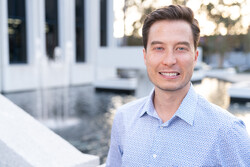Reconnect with your intuition, heal gently, and manifest your dreams with intention—one season, one cycle, one phase at a time.
MOON GARDEN:
Poetry for Manifestation
by Melody Godfred
Andrews McMeel, October 2025
 From Melody Godfred, author of the international bestseller Self Love Poetry for Thinkers & Feelers, comes MOON GARDEN: Poetry for Manifestation, a one-of-a-kind poetry book where the moon becomes your manifestation guide.
From Melody Godfred, author of the international bestseller Self Love Poetry for Thinkers & Feelers, comes MOON GARDEN: Poetry for Manifestation, a one-of-a-kind poetry book where the moon becomes your manifestation guide.
This isn’t a book that pushes you forward. MOON GARDEN welcomes you home to yourself.
Inspired by the lunar cycles and set in an ethereal moon garden, this spiritual poetry collection combines deeply personal poems and meditative prose to help you slow down, soften, and realign—with your inner truth and the rhythm of nature.
MOON GARDEN reminds us that personal growth and emotional healing don’t follow a straight line. Like nature, transformation unfolds like a garden, blooming in its own time. Whether you’re in a season of planting, tending, harvesting, or rest, this book offers wisdom, encouragement, and space to reflect on where you are—and where you’re meant to go next as you begin to move through the world with greater intention and presence.
More than a poetry book, MOON GARDEN: Poetry for Manifestation is a year-long companion for dream fulfillment and inner peace, guided by the quiet beauty of the night and the light that already lives within you.
Melody Godfred is a poet, author, and speaker who is devoted to empowering people to love themselves and transform their lives. She is the creator of the Self Love Pinky Ring™ and author of Self Love Poetry: For Thinkers & Feelers, The Shift: Poetry for a New Perspective, The ABCs of Self Love, and Moon Garden: Poetry for Manifestation. Her poetry has been recognized by Oprah Daily, TODAY with Hoda & Jenna, and Goodreads, among others, for its wisdom and ability to deeply resonate and uplift. Melody lives in Los Angeles with the loves of her life, Aaron, Stella, Violet, and Teddy.


 Today, Shazam is one of the most iconic and widely used apps in the world, with a brand name so recognizable that it has become a verb. But what few people know is that it was invented before smartphones existed. Chris dreamed up Shazam in 1999, when people were still buying CDs and carrying around portable CD players with wired headsets. There was no Bluetooth, Wi-Fi, and certainly no App Store. The closest thing to streaming music was the illegal sharing of digital files on platforms like Napster. There was no Facebook, Instagram, or even Myspace. Chris’s idea, that anyone, anywhere, could use their phone to identify a song playing in the background, sounded like science fiction. More than 100 experts told him it couldn’t be done, but Chris refused to give up. Instead, he assembled a dream team of brilliant minds—engineers, scientists, and business thinkers—who shared his vision (after some persuasion). United by a shared sense of purpose and determination, they set out to build the impossible from scratch. Together, they would develop the technology that would power the world’s first AI-driven consumer tool, years before anyone had even heard the word “app.” What followed was an eighteen-year odyssey marked by near-bankruptcy, groundbreaking innovation, sabotage, fierce competition with behemoths like Google and Sony, and bitter internal battles among team members. Through every setback and betrayal, Chris never gave up on his vision, and he continued to fight to keep Shazam on course. In the end, the idea that no one thought could work became a global phenomenon. This is more than a tech success story. It’s a deeply human, often emotional narrative about vision, grit, and the power of believing in the impossible.
Today, Shazam is one of the most iconic and widely used apps in the world, with a brand name so recognizable that it has become a verb. But what few people know is that it was invented before smartphones existed. Chris dreamed up Shazam in 1999, when people were still buying CDs and carrying around portable CD players with wired headsets. There was no Bluetooth, Wi-Fi, and certainly no App Store. The closest thing to streaming music was the illegal sharing of digital files on platforms like Napster. There was no Facebook, Instagram, or even Myspace. Chris’s idea, that anyone, anywhere, could use their phone to identify a song playing in the background, sounded like science fiction. More than 100 experts told him it couldn’t be done, but Chris refused to give up. Instead, he assembled a dream team of brilliant minds—engineers, scientists, and business thinkers—who shared his vision (after some persuasion). United by a shared sense of purpose and determination, they set out to build the impossible from scratch. Together, they would develop the technology that would power the world’s first AI-driven consumer tool, years before anyone had even heard the word “app.” What followed was an eighteen-year odyssey marked by near-bankruptcy, groundbreaking innovation, sabotage, fierce competition with behemoths like Google and Sony, and bitter internal battles among team members. Through every setback and betrayal, Chris never gave up on his vision, and he continued to fight to keep Shazam on course. In the end, the idea that no one thought could work became a global phenomenon. This is more than a tech success story. It’s a deeply human, often emotional narrative about vision, grit, and the power of believing in the impossible. Whether you’re dealing with constant demands, the pressure to perform, or the stress of adapting to rapid changes, the workplace is often where you’re tested the most mentally and emotionally. As psychotherapist, speaker, and podcast host Amy Morin discovered, sharpening your mental strength is the key to not only tackling workplace challenges but taking your performance to the next level. The Mental Strength Playbook is specifically designed to help you thrive professionally, with 50 scientifically proven plays you can use right now.
Whether you’re dealing with constant demands, the pressure to perform, or the stress of adapting to rapid changes, the workplace is often where you’re tested the most mentally and emotionally. As psychotherapist, speaker, and podcast host Amy Morin discovered, sharpening your mental strength is the key to not only tackling workplace challenges but taking your performance to the next level. The Mental Strength Playbook is specifically designed to help you thrive professionally, with 50 scientifically proven plays you can use right now.